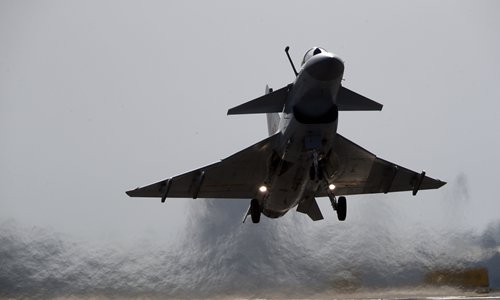


A J-10 fighter jet attached to an aviation brigade with the air force under the PLA Northern Theater Command takes off during a recent combat flight training exercise. Photo: eng.chinamil.com.cn
China's J-10 fighter jet celebrated its 21th birthday in spectacular fashion with six J-10s dazzling audiences at Pakistan's national day parade on Saturday.
During the parade in Islamabad, capital of Pakistan, the warplanes affiliated with the People's Liberation Army (PLA) Air Force completed a series of thrilling aerobatic maneuvers in single, double and six-plane formations, China Central Television (CCTV) reported on Sunday.
During the 18-minute performance, the Chinese aircraft released trails of red, yellow, white and green plumes, representing the colors of the national flags of China and Pakistan, winning waves of applause from spectators at the venue with each maneuver, according to a statement the PLA Air Force released on Sunday.
A local broadcaster welcomed the J-10s as they appeared on camera and called the performance "beautiful," in the Chinese language, CCTV reported.
"The China-Pakistan friendship is higher than the Himalayas, deeper than the oceans, sweeter than honey, and stronger than iron," the Pakistani broadcaster opined.
Pakistani weapons developed by China or co-developed by China and Pakistan including the JF-17 and F-7PG fighter jets, the Al-Khalid main battle tank and FM-90 and LY-80 air defense missiles also appeared in the parade, according to media reports.
The J-10's performance in Pakistan coincided with the 21th anniversary of the aircraft's maiden flight on March 23, 1998, CCTV reported.
The successful first flight of the J-10 marked China becoming the fifth country in the world to be capable of independently developing a third, or in other commonly used classification systems, a fourth generation fighter, the report said.
"The development of the J-10 has provided vast invaluable experience for China's future fighter jets," an anonymous military expert told the Global Times on Sunday.
During China's program to develop the J-10 fighter jet, Song Wencong, the J-10's chief designer who passed away in 2016, mentored the young Yang Wei who later became the chief designer of the J-20, China Aviation News reported.
"Song's contribution was not just about a single plane, it was about the development of the entire industrial system," Yang said.
The J-10 has seen improved versions since the original, including a technical demonstrator installed with a thrust vector control system that could be installed on the J-20 stealth fighter jet in the future, the anonymous expert said.

 Award-winning photos show poverty reduction achievements in NE China's Jilin province
Award-winning photos show poverty reduction achievements in NE China's Jilin province People dance to greet advent of New Year in Ameiqituo Town, Guizhou
People dance to greet advent of New Year in Ameiqituo Town, Guizhou Fire brigade in Shanghai holds group wedding
Fire brigade in Shanghai holds group wedding Tourists enjoy ice sculptures in Datan Town, north China
Tourists enjoy ice sculptures in Datan Town, north China Sunset scenery of Dayan Pagoda in Xi'an
Sunset scenery of Dayan Pagoda in Xi'an Tourists have fun at scenic spot in Nanlong Town, NW China
Tourists have fun at scenic spot in Nanlong Town, NW China Harbin attracts tourists by making best use of ice in winter
Harbin attracts tourists by making best use of ice in winter In pics: FIS Alpine Ski Women's World Cup Slalom
In pics: FIS Alpine Ski Women's World Cup Slalom Black-necked cranes rest at reservoir in Lhunzhub County, Lhasa
Black-necked cranes rest at reservoir in Lhunzhub County, Lhasa China's FAST telescope will be available to foreign scientists in April
China's FAST telescope will be available to foreign scientists in April